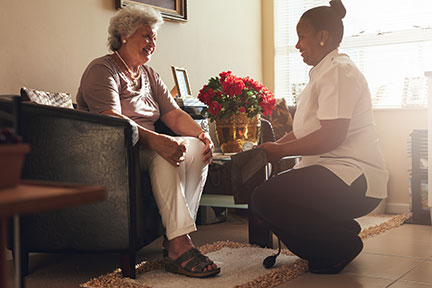
When you have an aging relative that requires routine care, you need to start exploring different care options. Often, you have the option of taking care of the person by yourself or sharing caregiving duties between friends or adult children. But it’s challenging to do this if the person who needs assistance has unique needs that require professional care. This explains why in-home care for seniors has gained popularity in recent years.
In its most basic definition, in-home care or senior home care refers to the provision of non-medical care in a client’s home. For most families, this form of caregiving solution is much more affordable compared to senior housing and nursing home options. That being said, if you have an elderly person who requires care and are considering in-home care, here are three things you need to know about this solution:
1. Seniors Receive Professional Care
Caregiving involves providing support to aging individuals. With in-home care, this support is offered by a trained caregiver within the elderly person’s home. Typically, in-home care involves helping seniors with their day-to-day tasks or activities that they find difficult to undertake as they age.
While there are people who opt to have a friend or family member provide care to an elderly person, home health care in the Orlando area enables families to have a trained caregiver to take care of their aging relatives. Most professional caregivers have nursing certifications or other similar credentials.
2. In-Home Care May Or May Not Include Home Health
Though there are in-home care service providers that offer home health care, there are others that are non-medical.
In-home care providers that integrate home health care have licensed medical professionals who attend to seniors from the comfort of their homes. In most instances, medical professionals offer medical care and support to seniors who struggle to manage a wide range of health conditions, including chronic diseases, dementia, Parkinson’s disease, and Alzheimer’s disease
On the other hand, there are in-home care providers only offering seniors non-medical care, such as home health aides, non-certified nurse aides, companions, homemakers, and certified nursing assistants. The most common services of non-medical in-home care providers include bedside care, bathing, dressing, meal preparation, medication reminders, companionship, housekeeping, and accompanying clients to appointments.
3. Getting An In-Home Caregiver Is Pretty Easy
For most people, getting an in-home senior caregiver isn’t a complicated process. For instance, families and individuals that require in-home care can make use of a search tool that the National Association of Area Agencies on Aging offers. Alternatively, physicians and healthcare providers that work with senior patients tend to have information on in-home care providers in specific areas.
Final Thoughts
With the number of seniors wanting to stay in their own homes rather than a nursing home, their family members are always looking for caregivers to support them with their daily activities from the comfort of their homes. Besides, staying in one’s home provides plenty of benefits. This has caused a high demand for in-home care providers.
 Author: Angela Wright
Author: Angela Wright
Angela Wright is a geriatric care nurse. She has many years of experience in long-term senior residential care. Angela now works as a supervisor in a nursing home. She shares her knowledge in geriatric care through guest posting.
